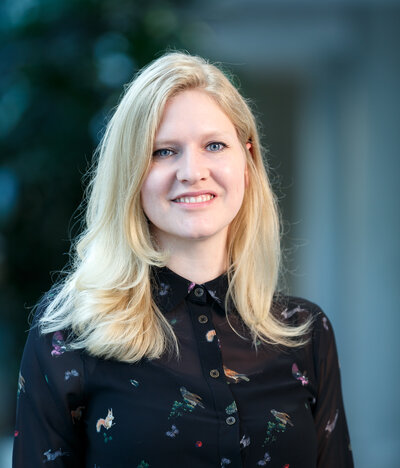Liesbeth Janssen
Department / Institute

RESEARCH PROFILE
Research group website: http://tps.phys.tue.nl/janssen. Liesbeth’s research describes materials that are far from thermodynamic equilibrium, ranging from non-crystalline polymers and colloidal glasses to living cell models. The Non-Equilibrium Soft Matter group studies the structural, dynamical, and mechanical properties of such materials using a combination of statistical-mechanical theory, analytical modeling, and computer simulations. This research provides new insights into the relation between the microscopic structure and the emergent dynamics of soft and living matter, and may lead to, for example, smart materials that are capable of adapting to their surroundings.
There are three key research areas: glass formation, which looks at amorphous non-crystalline solids, covering a wide range of substances, from gels to granular materials. The second area is active materials, which are composed of particles that can convert energy into autonomous motion. This requires development of new statistical physics. Potential applications range from bio-sensing to targeted drug delivery. The third area, bio-inspired and living materials, combines elements of the previous two. Studying the physical principles underlying responsive behavior in living systems may result in design and control of bio-inspired and smart materials.
Non-Equilibrium Soft Matter research is fascinating as it allows us to discover completely new areas of physics that represent a departure from classical statistical mechanics and thermodynamics. Applications range from creating self-healing plastics to cancer research to revolutionizing computer memory storage.”
ACADEMIC BACKGROUND
In 2012, Liesbeth received her PhD in Theoretical Chemistry (cum laude) from Radboud University Nijmegen, where she also received her MSc in Chemistry (summa cum laude) in 2008. She has previously worked in the field of molecular quantum physics, focusing on quantum-mechanical first-principles treatments of molecular photodissociation, scattering processes in an external field, and ultracold controlled chemistry. Following postdoctoral stays at Columbia University, New York and Heinrich-Heine University Duesseldorf, for which she received funding through the Rubicon, Niels Stensen, and Alexander von Humboldt fellowships, she joined Eindhoven University of Technology in 2017.
Key Publications
-
L.M.C. Janssen,D.R. Reichman
Microscopic dynamics of supercooled liquids from first principles
Physical Review Letters (2015) -
L.M.C. Janssen,A. Kaiser,H.W. Löwen
Aging and rejuvenation of active matter under topological constraints
Scientific Reports (2017) -
A. Klein,Y. Shagam,W. Skomorowski,P.S. Zuchowski,M. Pawlak,L.M.C. Janssen,N.G. Moiseyev,S.Y.T. van de Meerakker,A. van der Avoird,C.P. Koch
Directly probing anisotropy in atom-molecule collisions through quantum scattering resonances
Nature Physics (2017) -
M. Kirste,X. Wang,H.C. Schewe,G. Meijer,K. Liu,A. van der Avoird,L.M.C. Janssen,K.B. Gubbels,G.C. Groenenboom,S.Y.T. van de Meerakker
Quantum-state resolved bimolecular collisions of velocity-controlled OH with NO radicals
Science (2012)
Current Educational Activities
Ancillary Activities
No ancillary activities